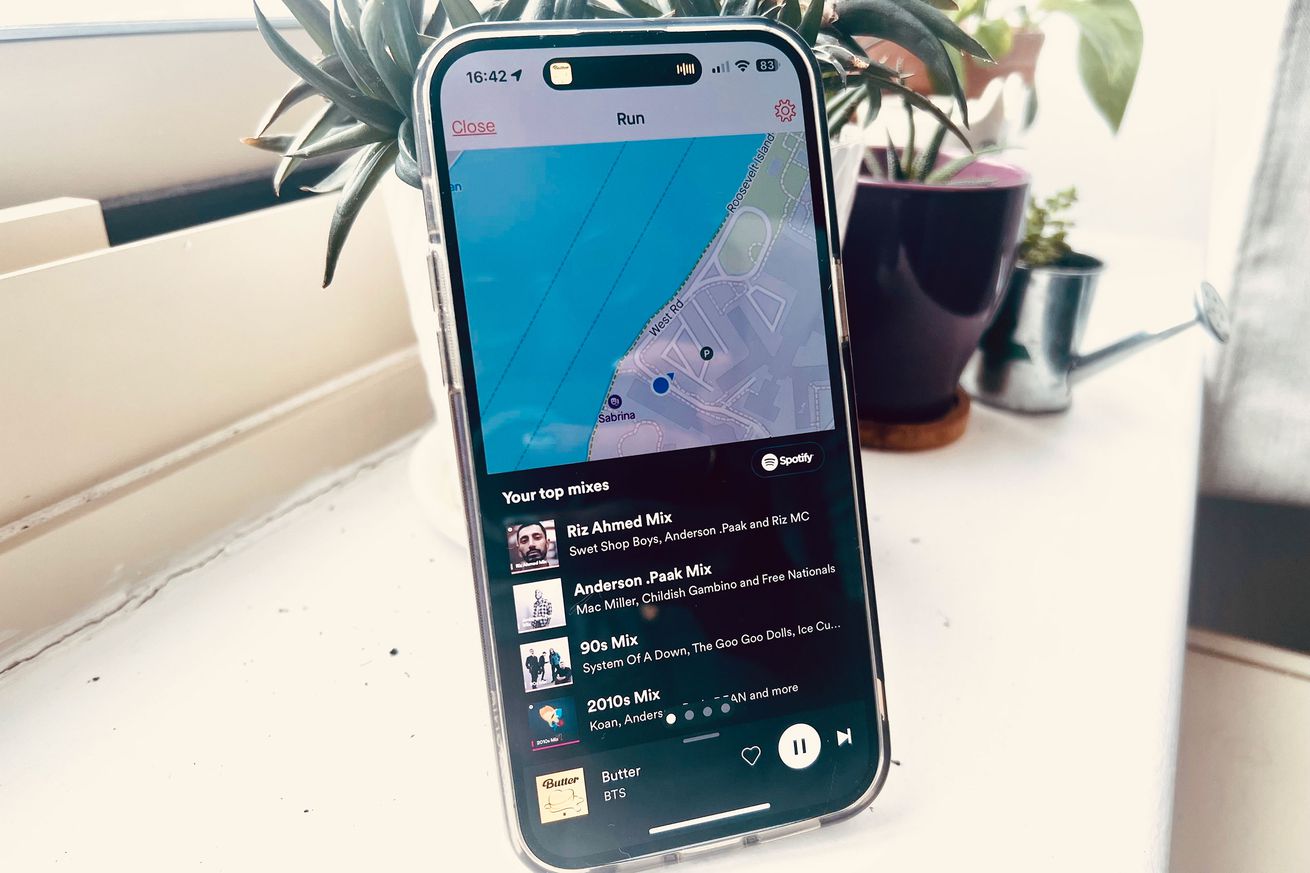
It’s been 84 years, but Strava finally has a Spotify integration
Strava has been around since 2009, but today, the popular fitness app is finally, finally adding an in-app Spotify integration. Instead of having to switch between apps, you can now access your Spotify favorites from the workout record screen. And, perhaps the best part is you don’t need a Spotify or Strava subscription to use it.
“It’s just one of those things we know people have been asking for a long time, and finally, the stars aligned,” says Mateo Ortega, Strava’s vice president of connected partnerships. When asked about the possibility of adding other platforms, Ortega didn’t rule out the possibility but noted that Spotify was a clear first step.
It doesn’t take a rocket scientist to see why Strava and Spotify partnering matters. Spotify is the most popular audio streaming service. Strava is one of the most popular fitness apps. Millions of people rely on music, podcasts, and audiobooks to distract from the physical agony of a grueling workout (or, you know, keep them motivated during the tough parts). But aside from the obvious reasons, an in-app Spotify widget eliminates the need to toggle between apps any time you want to switch up your tunes. Less time fumbling on your phone means you’re more likely to stay in the zone.
On the other hand, the integration seems like a long overdue addition — one that’s perhaps too late now that smartwatches and fitness trackers can also stream music. For example, I personally found this to be a bigger problem when I relied on my phone to track workouts circa 2013. Plus, several other fitness apps have added Spotify or Apple Music integrations over the years.
That said, when I tried the integration for myself, I could see the appeal. All you have to do is tap the record button and then select the music icon in the right-hand corner. From there, you’re prompted to connect your Spotify account. Once that’s done, you can browse through your top mixes in a little widget within the Spotify app. This is a bit different from some other music integrations that I’ve tried. In the Runkeeper app, for example, enabling Spotify just redirects me to the app’s running playlist page. It doesn’t actually bring me to the playlists that I’ve painstakingly curated. Likewise, the Apple Music integration auto-plays a single playlist and displays only the current track at the top of the screen.
It’s a small difference, but I was pleasantly surprised by Strava’s in-app widget approach. Not only can you swipe up to see what’s in the queue, but you can browse through various mixes — ones that you’ve curated yourself, as well as frequently listened to Spotify-made playlists.
“If people forget that they used to have to open Spotify, come back to Strava and hit record, and to change a song, switch back to Spotify — if it changes their behavior and keeps them in the moment? That is how this is going to be a good integration for us,” says Ortega.
The only quirk I noticed is that if you pause for a long-ish period, you’ll be asked whether you want to continue listening. You’ll have to reauthorize Spotify, though that part happens automatically once you hit play again.
This integration ultimately works best for users who use the Strava app to record workouts, as opposed to those who import them from other services or trackers. Even so, the move bolsters Strava’s status as a de facto fitness hub.
“Our strategy has always been to be the Switzerland of fitness devices.”
Right now, the digital fitness and wellness space is made of a bunch of little fiefdoms; there are a ton of apps for tracking runs, rides, nutrition, and route planning but only a handful of ways to view all of your data in one place. But while you can consolidate your data within Apple and Google’s health APIs, it leaves a gaping hole in terms of community. As Fitbit recently proved, making social features dependent on hardware has its downsides when social features are shut down or friends opt for a different platform.
“Our strategy has always been to be the Switzerland of fitness devices. We want everything to work with Strava,” Ortega says.
And by everything, Ortega isn’t really exaggerating. The Lululemon Mirror, Peloton bikes and other equipment, Garmins, Apple Watches, Komoot, Zwift, and MyFitnessPal — these are just a handful of the platforms that work with Strava. This is what makes Strava’s aggressive integration strategy savvy. It doesn’t really matter what fitness tracker or app you use — you can still connect with friends regardless of the platform. So it’s no surprise that Strava has emerged as a popular place to share your fitness exploits and keep your data in one place. Adding Spotify to the mix just gives Strava users more reasons to stick around.

